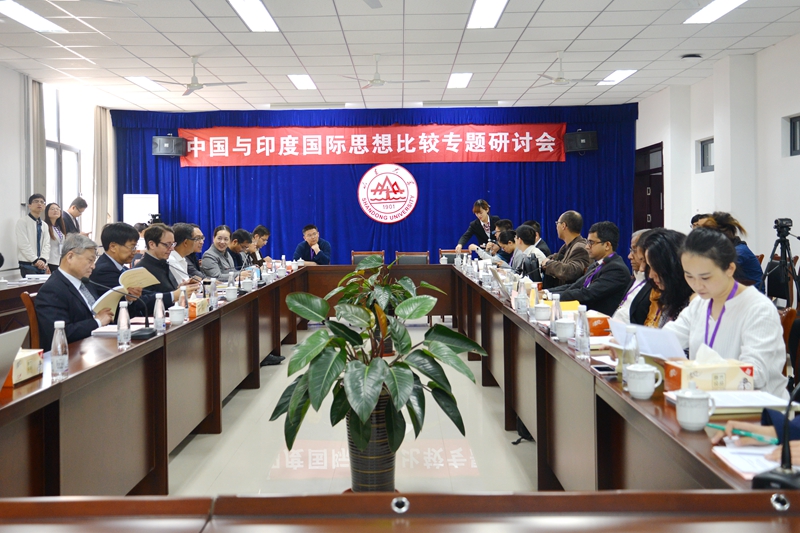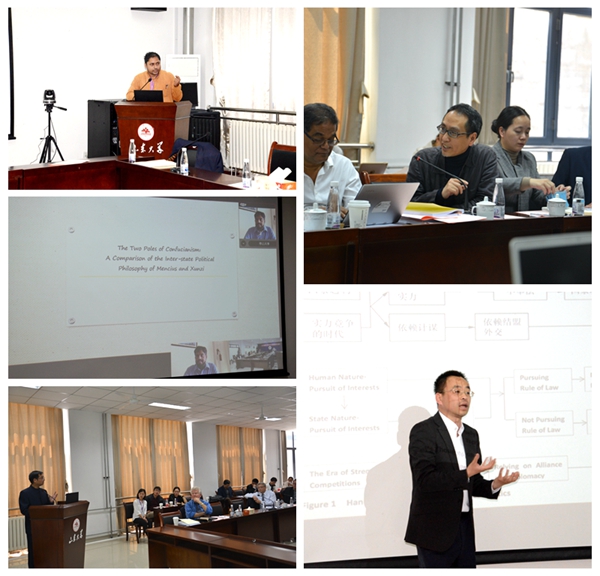
A workshop on “China-India Comparative International Thought” was held recently on Qingdao Campus, Shandong University. Co-organized by the School of Political Science and Public Administration (PSPA) of SDU and Institute of International Relations of Tsinghua University, the workshop focused on rediscovering and interpreting ancient political thoughts in both China and India and their implications to the contemporary theoretical study of international relations (IR). More than twenty distinguished professors and post-doc researchers in IR and political theory from international prestigious universities participated in a series of lively roundtable discussion.
Kong Lingdong, Secretary of the Party Working Committee and Executive Deputy Director of the Management Committee of Qingdao Campus, deliverd an opening remark and welcomed all the scholars present.
The two-day workshop included six panels. Each panel was composed of a themed speech, comment and the Q&A session. In the first panel, Professor Roger T. Ames from Peking University presented his research entitled “Sunzi: Tactics, Strategy, and Philosophy in International Relations”, which laid out the historical context and trends in ancient Chinese philosophers’ world view. He also elaborated on the intimate relationship between philosophy and warfare from Master Sun’s perspective. Professor Patrick Olivelle from the University of Texas-Austin made an inspiring comment on the presentation. The first panel ended with a twenty-minute discussion on the cosmology in traditional Chinese and Indian culture.

The themed speeches of the second and third penal were delivered respectively by Professor Sun Xuefeng from Tsinghua University and Professor Xu Jing from Institute of World Economics and Politics of Chinese Academy of Social Sciences. In his presentation entitled “Han Fei’ Thoughts on Interstates Politics”, Professor Sun Xuefeng argued that Han Fei’s approach in achieving the states’ fundamental interest and the highest goal, which is survival and hegemony, is through pursuing the rule of law. Professor Xu Jing presented his paper “The Two Poles of Confucianism: A Comparison of the Inter-State Political Philosophy of Mencius and Xunzi”, in which he analyzed Mencius and Xunzi’s understanding of international power as well as the conflict of their theories about state power. Professor Amitav Acharya at Schwarzman Scholars, from Tsinghua University and Professor Kanad Sinha from University of Calcutta, commented on the above two speeches.
Professor Qi Haixia from Tsinghua University kicked off the panel on the second day with her essay “The Failure of Balancing: An Analysis of Late Warring State Period”, in which she attempted to unravel the reason the six states failed to balance effectively against the state of Qin during its rising, Professor Zhang Shulan from Shandong University commented on her paper.
The workshop ended with a pledge made by all the participants of ongoing discussions on the orientation and outlook of comparative research in IR and political theory.
Translated by Liu Yaoling
Edited by Song Li Hong & Yijun